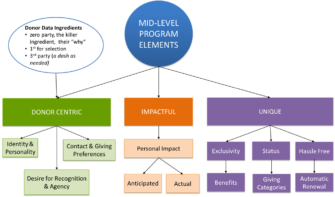Do Rich Donors Differ from Not-Rich Donors? From “Middle”-Rich Donors?
Do people writing four figure checks (i.e. $1,000 to $9,999) have different needs from those donating $20 or those moving the comma and decimal point to the right for an even larger gift?
What about the “high touch package to create an elevated donor experience” for the four-figure check group? This is a recommendation in the fundraising blogosphere for building a mid-level giving program. Where is the evidence that middle rich people like a more expensive paper stock? Or that less rich people don’t? And what the heck is an “elevated” donor experience?
Another super helpful blogosphere piece of advice for building your mid-level program is four figure check writers need to feel wanted…huh? As opposed to all those other donors who want to feel unwanted.
Or what about the advice to solicit these folks less frequently but be sure to send more “no-ask” communications.
Where is the evidence four-figure check writers really appreciate a three-to-five-page newsletter (another mid-level donor “best practice” floating out there in the ether), whereas the less well-heeled have no interest?
There are likely far more differences within your four-figure check writers segment than between them and the folks on either financial side of them. Having said that, there are some evidence-based differences that the world of behavioral science has surfaced. Rich people or sort of rich people are, as it turns out, a bit different on that basis alone.
Please join DonorVoice’s Kiki Koutmeridou, Chief Behavioral Scientist and Stefano Di Domenico, Director of Supporter Motivation for the only learning session on mid-level giving fueled by the science of behavior.
This educational session is next Thursday, March 4th, 11am (EST). Registration is limited but free and prioritized for charity staff.
Kiki and Stefano will review our behavioral science framework and provide all manner of detail on digging deeper to go beyond the superficial “thank you call” or “handwritten note” and instead cover the job-to-be-done with a touchpoint and, as important, the content to achieve that job.

Here is a brief snippet of what they’ll cover.
- Actual impact information. While increasing donors’ perceived impact g. what an amount could buy increases giving, not all donors respond positively to information about the charity’s actual impact e.g. number of people helped last year. The latter has been shown to reduce subsequent giving for lower value donors but to increase it for higher value donors.
- Desire for agency. Some higher value donors want the organization to not just receive their money but also their ideas and advice. This desire for additional involvement with the organization is a preference that can be easily discovered and satisfied to increase their commitment and value.
- Desire for recognition. Not everyone who makes a higher value gift wants to be publicly recognized for it. Some donors, and especially people with a heightened sense of responsibility, can be turned off by it, while others might prefer a more private form of recognition e.g. a letter or phone call.
These pillars of a mid-level giving program – Donor Centric, Impactful and Unique – can be spruced up with additional behavioral insights. For example, attaching social status to certain giving levels can be an effective way to nudge someone to increase their gift. Or offering exclusive premiums and benefits could tip the scales for someone considering giving at the desired level.
But, premiums and social proof messages and status signaling shouldn’t be seen as a free lunch. Often, these nudges undermine people’s natural, innate, high quality motivation and replace it with external, controlling motivation. This can boost initial response only to hurt lifetime value.
We’ll cover how to effectively combine these elements into your program. If you’re looking for a bit more rigor in being ‘donor-centric’ and applying it to those lovely four-figure check writers, register here and claim one of the limited seats.
Again, it’s free and with priority seating for charity staff. Register here.
Kevin


